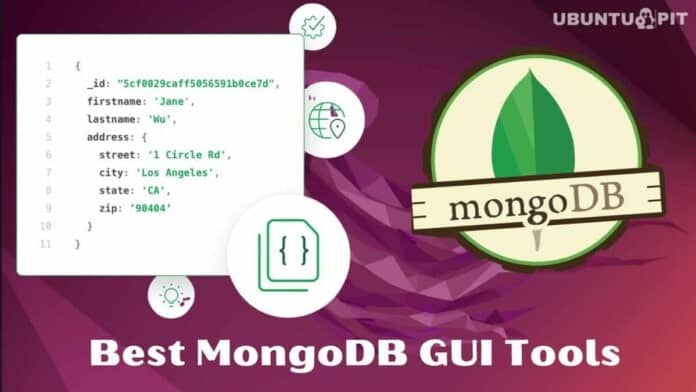As enterprises generate more unstructured data, NoSQL databases are gaining popularity. Unlike relational databases that store data in tables or relations (intersections of rows and columns), NoSQL databases can accommodate the structureless nature of some types of data.
Some people needed a Database that could store lots of unstructured data. So Dwight Merriman, Eliot Horowitz, and Kevin Ryan created MongoDB. It is an open-source document-oriented database. What makes MongoDB stand out is its horizontal scalability and load-balancing capabilities which provide users with unmatched levels of flexibility.
In this article, we will learn everything about MongoDB, its key features, and some of the best MongoDB GUI Tools available in the market.
Overview of MongoDB
MongoDB is classified as a NoSQL database because it stores data differently than traditional relational databases. MongoDB stores data differently than other databases. Instead of storing data in rows and columns like traditional tables, MongoDB uses JSON-like documents. These documents are actually BSON (Binary JSON) files. It is written in C++ and is high-performance and open source.
One of the benefits of MongoDB over other databases is that it has dynamic schemas, which means that data integration for certain kinds of applications can be done more quickly.
Furthermore, MongoDB has extensive index support that can be used for query profiling, replication, and fail-over support. It also allows users to set up indexing and auto-sharding for cloud scalability as well as load balancing.
Key Features of MongoDB
The main features of MongoDB are given below:
- MongoDB is a document-oriented database that can be used on multiple platforms. It offers great performance, high availability, and the ability to scale automatically.
- MongoDB has a flexible schema that uses JSON-like documents. Users can perform field, range queries, and regular expression searches. Also, indexes can be created on any field in the document for even faster searching.
- Provides replication and high availability with automatic failover.
- Scales horizontally and can easily manage large quantities of data due to Sharding.
- Written in C++ and free and open source software
- Provides drivers for many programming languages that can be used to write MongoDB applications.
- Most data is stored in RAM, making it simpler for developers to access information and run queries.
10 Best MongoDB GUI Tools
Even though there is no graphical user interface for administering the database, it can still be done by using the mongo shell. The Mongo shell is a great way to access JavaScript and databases for MongoDB.
In addition, there are independent developers who have created excellent open source graphical interfaces. This article contains a list of the best MongoDB GUIs available, providing insight into the quality of software that is out there.
1. Studio 3T (formerly MongoChef) – Professional Client, IDE, and GUI for MongoDB
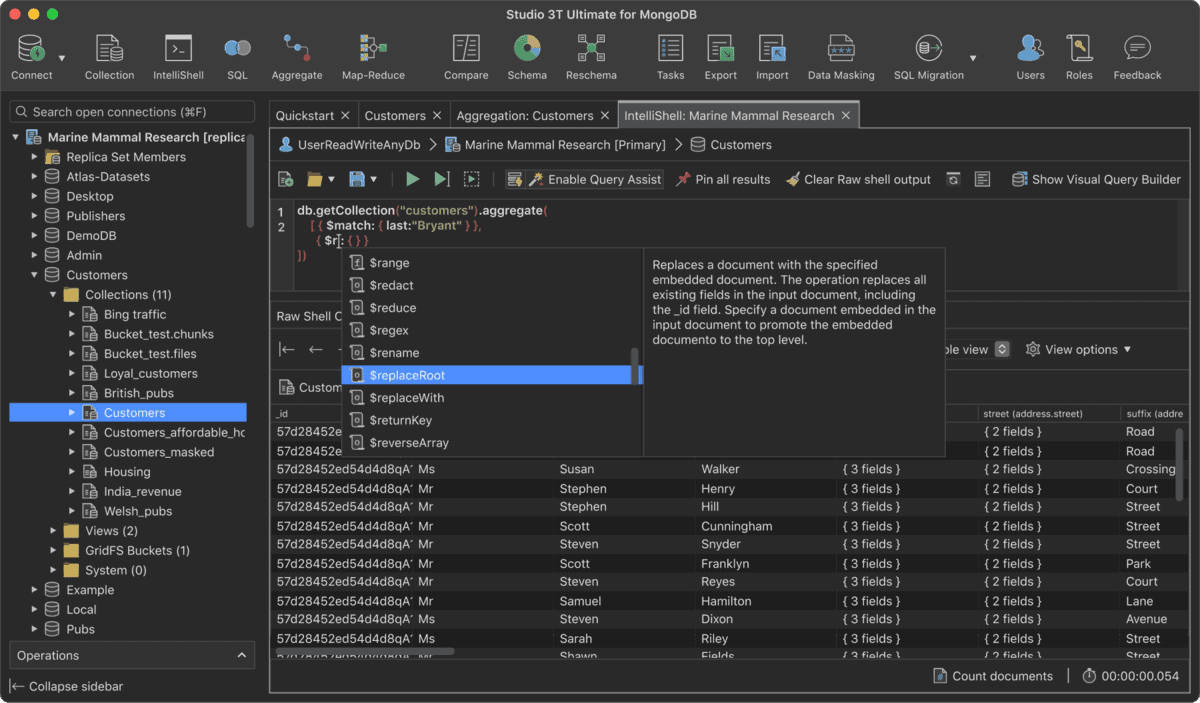 Studio 3T is a MongoDB GUI that offers an elegant, intuitive interface for MongoDB users, whether they’re newbies or seasoned pros. It’s one of the best MongoDB GUIs on the market, offering features like query auto-completion, schema visualization, and support for MongoDB’s aggregation framework.
Studio 3T is a MongoDB GUI that offers an elegant, intuitive interface for MongoDB users, whether they’re newbies or seasoned pros. It’s one of the best MongoDB GUIs on the market, offering features like query auto-completion, schema visualization, and support for MongoDB’s aggregation framework.
Studio 3T is the best MongoDB GUI tool available because it has a SQL Migration feature that works with widely used databases such as PostgreSQL, Sybase, Oracle, MySQL, IBM DB2, and SQL Server.
What sets Studio 3T apart from other MongoDB GUIs is that it functions as a client, an IDE, and a GUI all in one. Studio 3T provides a streamlined, user-friendly experience when importing databases or configuring table-to-JSON connections. Plus, you can preview documents to ensure accuracy before finalizing the import process.
2. Robo 3T (formerly Robomongo) – Free, Open-source MongoDB GUI
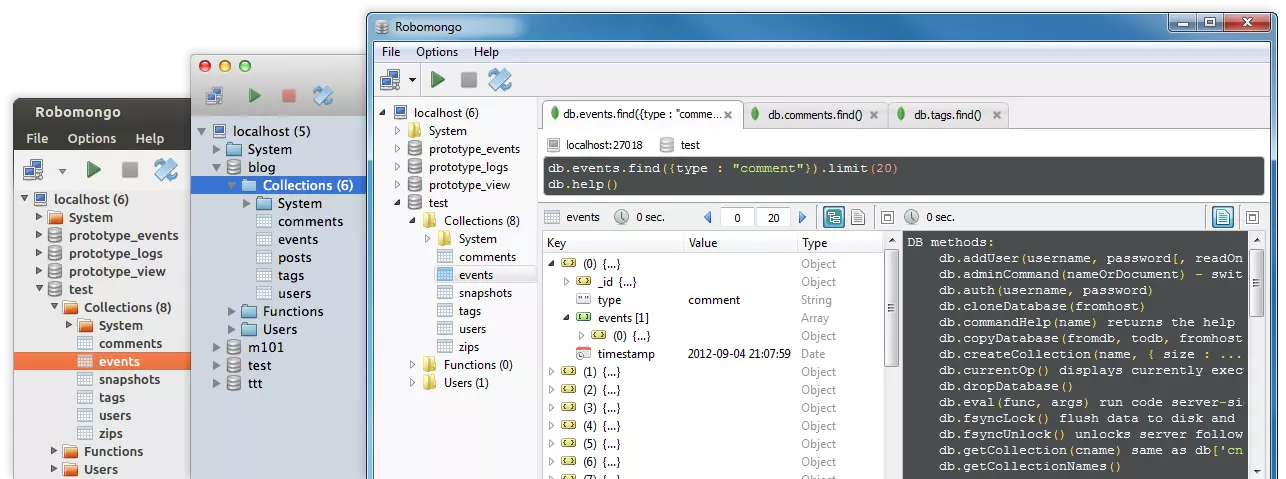 Robo 3T is a MongoDB management tool that allows you to connect to your database and quickly get started with your data. It’s shell-centric and cross-platform, allowing users to work with their data efficiently. The app also provides comprehensive documentation, making it a great resource for learning about MongoDB.
Robo 3T is a MongoDB management tool that allows you to connect to your database and quickly get started with your data. It’s shell-centric and cross-platform, allowing users to work with their data efficiently. The app also provides comprehensive documentation, making it a great resource for learning about MongoDB.
With it, users can easily manage their databases by writing, editing, and executing code. Robo 3T’s embedment of the JavaScript engine that powers MongoDB’s mongo shell is one of its standout features. This allows you to do everything in Robo 3T that you could do in the mongo shell.
With Robo 3T, you can connect to any MongoDB instance, whether it’s running on your local machine or in the cloud. The app makes it easy to browse and query your data and perform administrative tasks such as creating new databases and collections.
Robo 3T is available for Windows, Mac, and Linux. It’s a great option for those who want a MongoDB GUI that is easy to use and packed with features.
3. MongoDB Compass – The Official MongoDB GUI
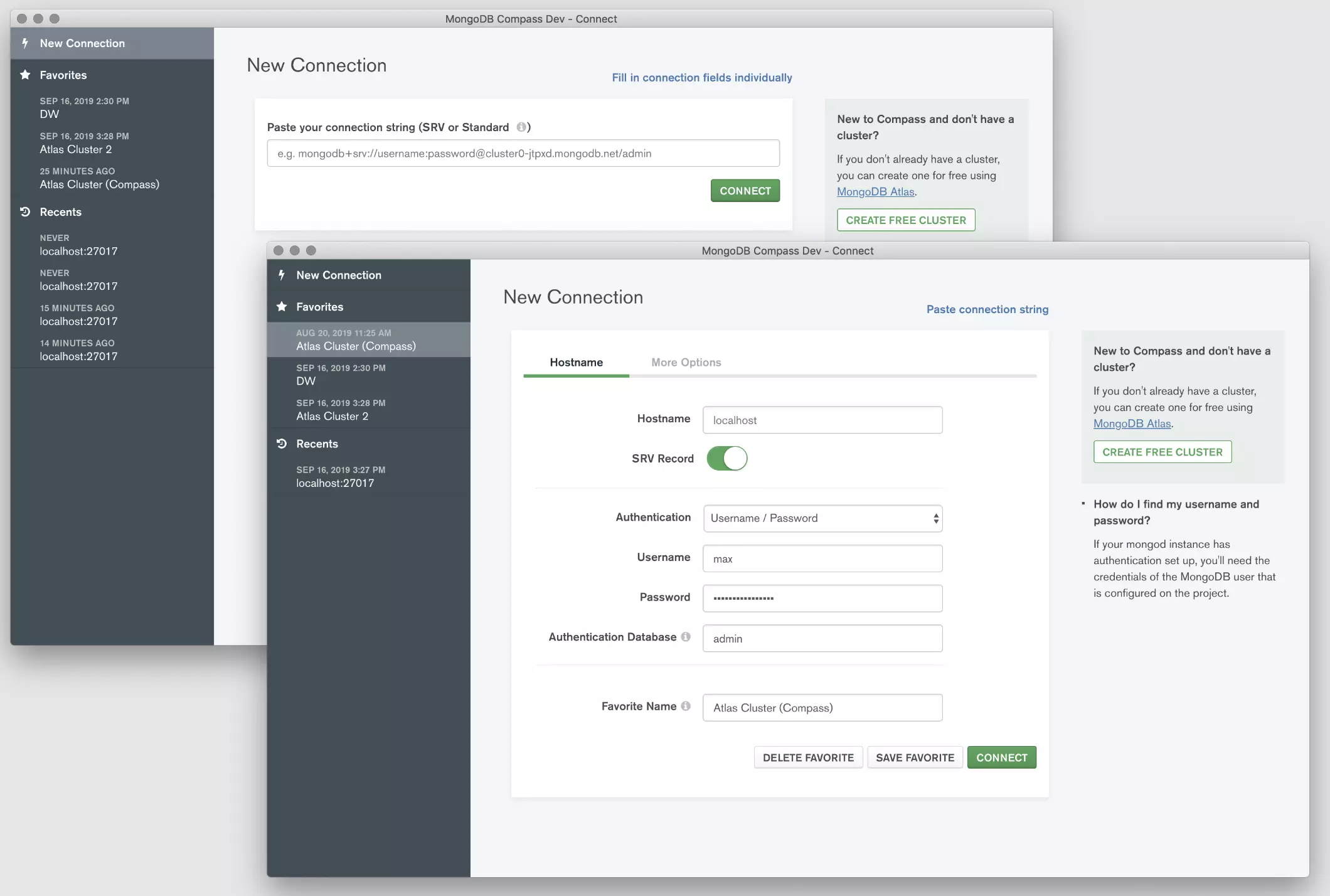 MongoDB Compass is the official MongoDB GUI. It’s a MongoDB client that provides a graphical interface for database administration and data exploration. Compass is available as a desktop application and as a web app.
MongoDB Compass is the official MongoDB GUI. It’s a MongoDB client that provides a graphical interface for database administration and data exploration. Compass is available as a desktop application and as a web app.
Compass enables you to make smarter indexing, document validation, and query optimization decisions. It also visualizes your data so you can better understand the structure and contents of your databases.
MongoDB Compass does not require query language. It provides users with a MongoDB schema graphical view and analysis of documents within an intuitive GUI.
This MongoDB GUI tool allows users to explore data visually, run ad hoc queries in seconds, and view server status and query performance. CRUD operations are necessary to interact with data, and it offers a better approach that makes it easier to execute these operations.
If you’re new to MongoDB, Compass is a great way to get started. It’s easy to use and provides all the features you need to get up and running with MongoDB quickly.
4. TablePlus – Modern, Native Tool for Database Management
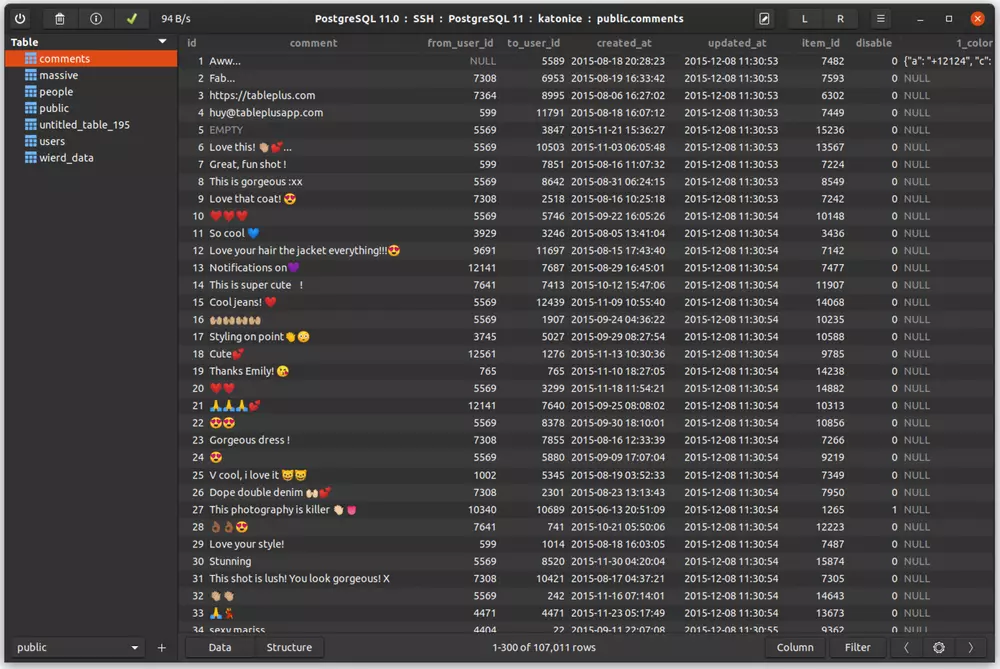 If you’re looking for a MongoDB GUI, TablePlus is an excellent option. It’s a powerful and easy-to-use MongoDB client that makes working with your database easier than ever. Not to mention, it has a few other features that make it even handier, like an integrated MongoDB IDE.
If you’re looking for a MongoDB GUI, TablePlus is an excellent option. It’s a powerful and easy-to-use MongoDB client that makes working with your database easier than ever. Not to mention, it has a few other features that make it even handier, like an integrated MongoDB IDE.
TablePlus is designed to make database management easy, fast, and efficient for users. With a native build and simple design, TablePlus packs a powerful punch when it comes to features.
With the multiple window and tab view, you can easily get an overview of your entire database. Plus, with Code Review, you’ll always know what changes have been made to your database, keeping you in control.
5. dbKoda – Open-source, Next-generation IDE for MongoDB
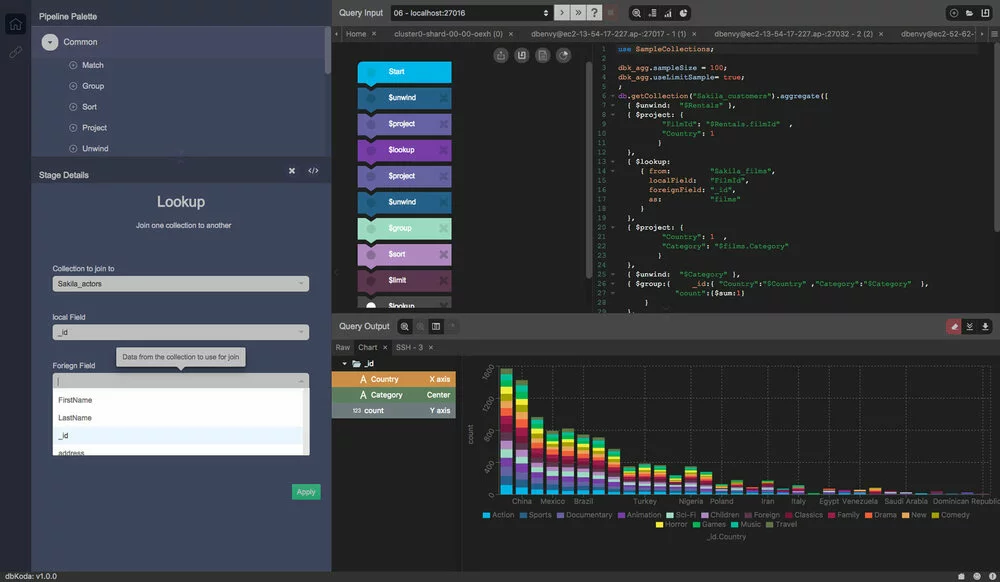 If you’re looking for a cutting-edge IDE for MongoDB, look no further than dbKoda. This JavaScript/Electron framework provides everything you need to develop, administer, and optimize MongoDB databases. Plus, it’s free and open source!
If you’re looking for a cutting-edge IDE for MongoDB, look no further than dbKoda. This JavaScript/Electron framework provides everything you need to develop, administer, and optimize MongoDB databases. Plus, it’s free and open source!
The Rich text editor comes with auto-complete, syntax highlighting, and code formatting features.
Besides, there is also a real-time Performance dashboard for your convenience. If you want to know more about how the system works, there is always a visual explanation plan. Index advisor provides recommendations on index usage.
dBKoda offers multiple features that improve user productivity, including a real-time view of activity, a storage analyzer, MongoDB commands convertible to Node.js syntax, and more.
dbKoda’s code editor not only provides auto-complete and syntax highlighting for MongoDB queries and scripts but also offers handsome output formatting options. With one click, you can generate visual explain plans that suggest indexes to improve performance with a button to create those indexes–all from the query builder, which makes simple queries or complex aggregates easy.
With dbKoda, you can manage your configuration, user roles, logging, database storage, and data import/export by filling in the blanks on the command line. Utilize the SSH terminal to access the server OS and issue commands directly from within dbKoda– no more having to look up obscure MongoDB syntax!
6. NoSQL Manager – Fastest Way to be Productive with MongoDB
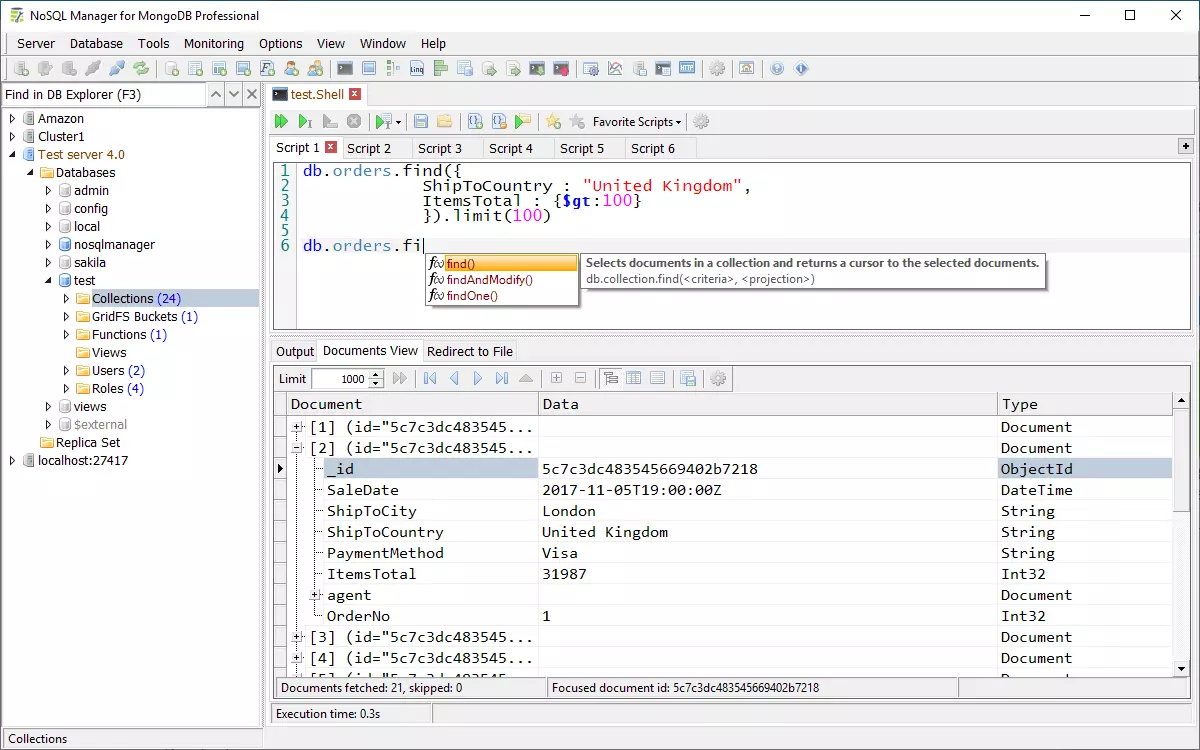 NoSQL Manager is a great tool for those who want to use MongoDB, as it offers both shell functionality and an easy-to-use interface. With support for multiple databases like MongoDB Enterprise and Amazon DocumentBD, users can explore, read, and change documents without any trouble–all while keeping performance in mind. This GUI can also manage collections, users, roles, and functions much more efficiently than other options.
NoSQL Manager is a great tool for those who want to use MongoDB, as it offers both shell functionality and an easy-to-use interface. With support for multiple databases like MongoDB Enterprise and Amazon DocumentBD, users can explore, read, and change documents without any trouble–all while keeping performance in mind. This GUI can also manage collections, users, roles, and functions much more efficiently than other options.
MongoDB is Enterprise certified and supports LDAP, Kerberos, and MONGODB-X509 authentications. The UI Shell it uses has syntax highlighting, code auto-completion, and hints–making it fully functional.
NoSQL Manager is a robust document viewer and editor that works with MongoDB on Azure Cosmos DB, Amazon DocumentDB, and Percona Server for MongoDB. You can connect to replica sets, sharded clusters, or standalone hosts. With the easy-to-use document viewer and editor modes (Tree view, Table view, or JSON), you will be able to find what you need quickly and efficiently.
7. DronaHQ
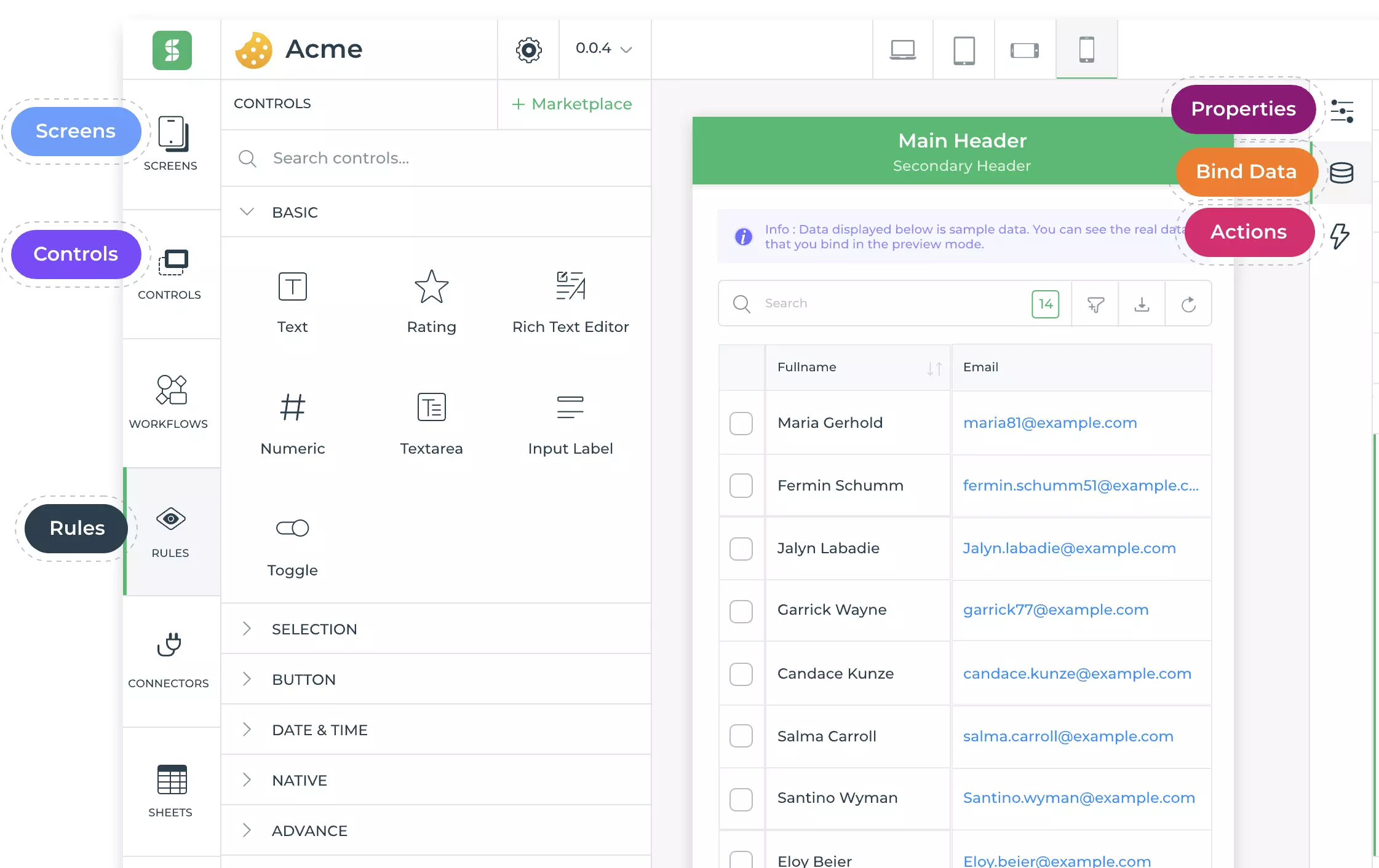 With DronaHQ, you can easily create web-based internal tools without having to know complex code. By using this, you can create internal tools, GUIs, Admin Panels, Dashboards, and custom apps. DronaHQ’s MongoDB GUI tool makes it easy to create fully-featured MongoDB GUIs with pre-built UI controls and a WYSIWYG editor. Consequently, CRUD operations have become much quicker and easier.
With DronaHQ, you can easily create web-based internal tools without having to know complex code. By using this, you can create internal tools, GUIs, Admin Panels, Dashboards, and custom apps. DronaHQ’s MongoDB GUI tool makes it easy to create fully-featured MongoDB GUIs with pre-built UI controls and a WYSIWYG editor. Consequently, CRUD operations have become much quicker and easier.
The easy-to-use visual builder offers form fields, charts, lists, buttons, table grids, detailed views, and custom UI control. The GUI-based query builder also allows for server-side filtering using MongoDB GUI across all of your databases, whether SQL or NoSQL.
DronaHQ’s MongoDB connector lets you connect to any type of MongoDB database, whether it is self-hosted or managed. You can also use a connection string to interact with data in the most efficient way possible.
8. NoSQLBooster (MongoBooster) – Smartest GUI Tool and IDE for MongoDB
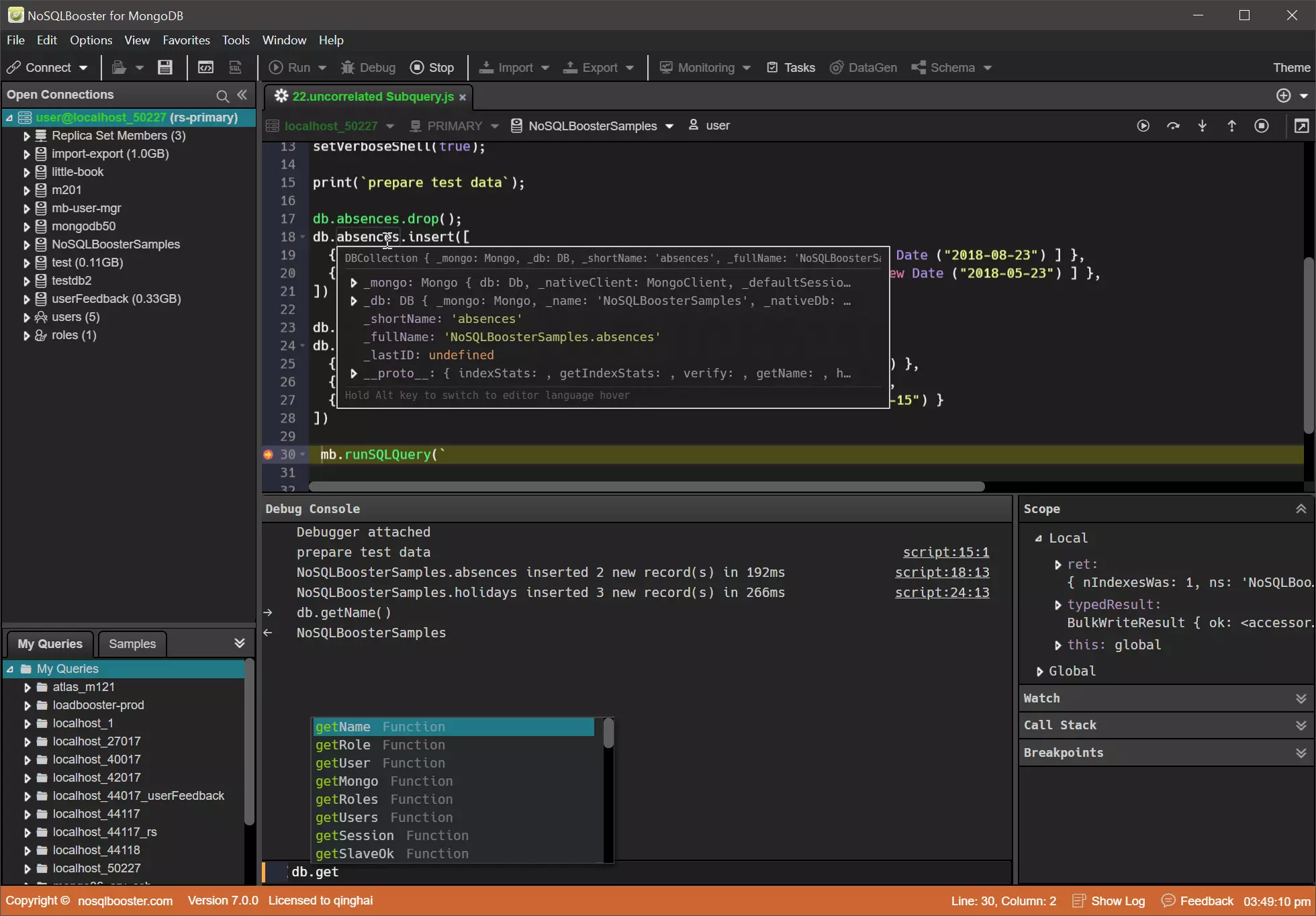 NoSQLBooster provides an all-inclusive GUI for MongoDB, complete with SQL query support, script debugger, server monitoring, and true IntelliSense. NoSQL Booster’s IntelliSense language service is similar to Studio 3T’s IntelliShell and provides completions, collection names, properties, and field names as you type.
NoSQLBooster provides an all-inclusive GUI for MongoDB, complete with SQL query support, script debugger, server monitoring, and true IntelliSense. NoSQL Booster’s IntelliSense language service is similar to Studio 3T’s IntelliShell and provides completions, collection names, properties, and field names as you type.
The query builder in SQL lets you use the language to run queries on your collections. Different Node.js modules can be imported into the shell for ease, like lodash, bluebird, ShellJS, or moment.js.
9. HumongouS.io – Modern and Secure MongoDB Online GUI
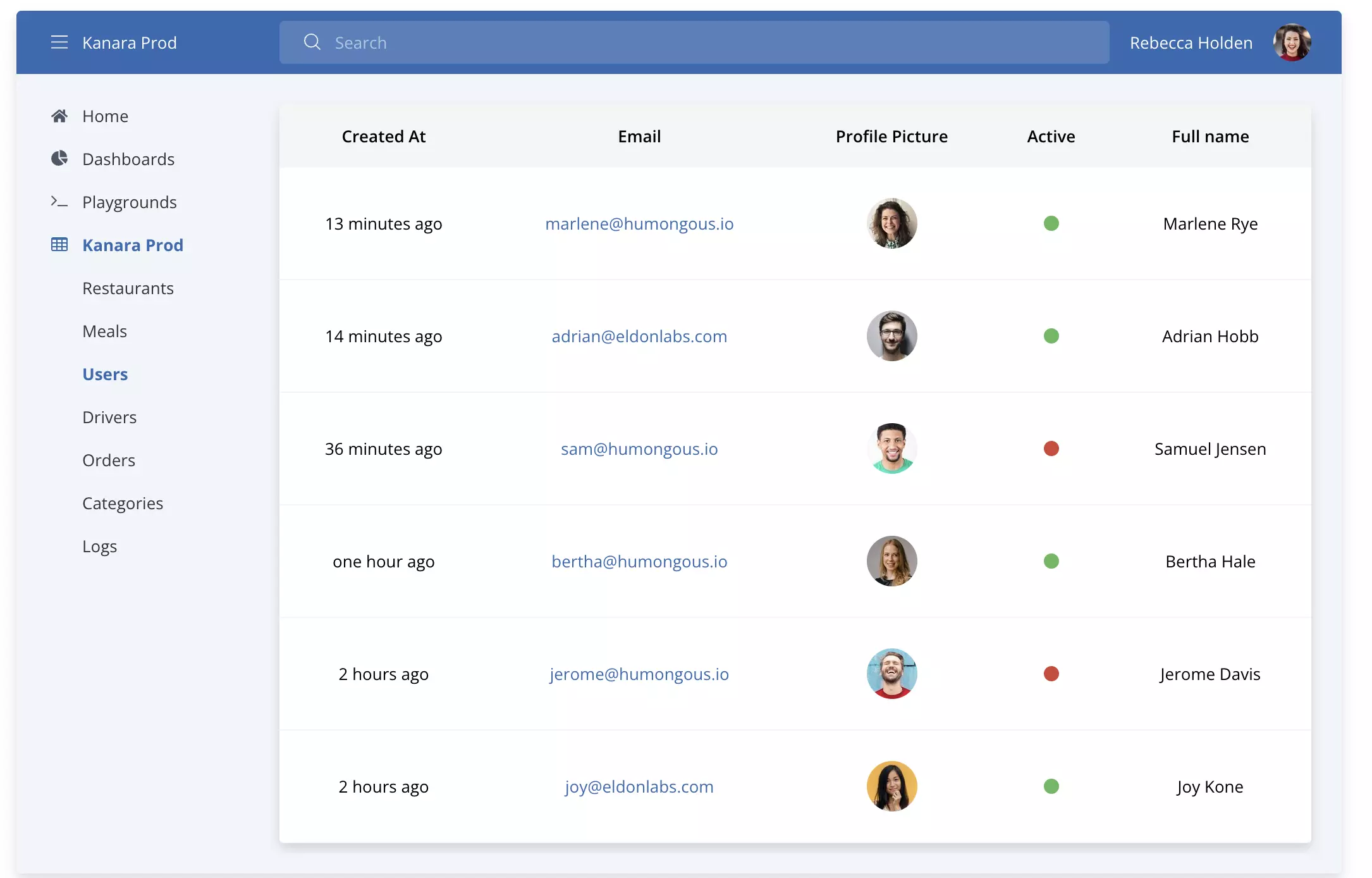 More than just a MongoDB GUI, HumongouS.io is an online interface creation tool that anyone can figure out how to use—no tech skills required. And since it’s offered as an online interface, you and others working with the app will be able to do so from any type of end-user device: mobile phone, tablet, or laptop.
More than just a MongoDB GUI, HumongouS.io is an online interface creation tool that anyone can figure out how to use—no tech skills required. And since it’s offered as an online interface, you and others working with the app will be able to do so from any type of end-user device: mobile phone, tablet, or laptop.
HumongouS.io is an all-in-one solution for anyone that needs to work with MongoDB. Its Admin Panel requires no code and is perfect for your non-technical team members, while the Dashboards are lightweight and flexible – perfect for PMs and execs. For engineers that need to do data analysis or debug on a daily basis, it has the Query Editor – which has everything you need and more!
Creating a form with HumongouS.io is as easy as one click. It automatically generates a form for each of your collections that you can later personalize with our various form widgets.
It offers a variety of options, like a simple on & off switch, or more complex features like a rich text field or an s3 file uploader. No matter what your needs are, HumongouS.io have you covered.
The smart search engine not only optimizes MongoDB queries but also understands the intent behind user requests. If you want finer control over your search queries, switch to query mode and write any MongoDB expression.
10. Mingo.io – The Best GUI for MongoDB
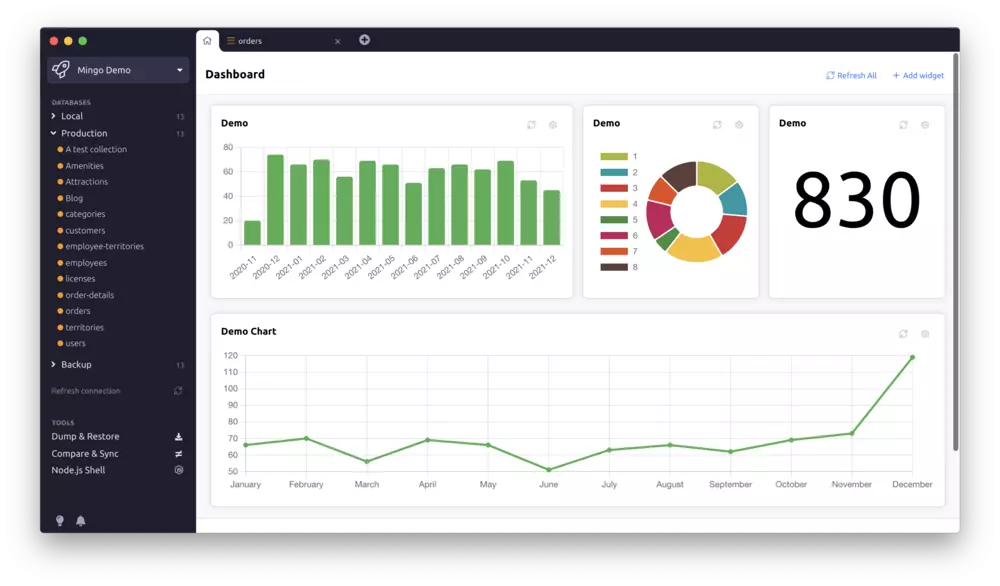 Mingo.io is the perfect tool for getting your MongoDB data under control. With Mingo, you’ll fall in love with your data all over again. Data relations are easy to view with Mingo – simply open up a document and preview the data relations directly within it. Plus, if you need to access another document, Mingo will recognize references and let you do so with just one click.
Mingo.io is the perfect tool for getting your MongoDB data under control. With Mingo, you’ll fall in love with your data all over again. Data relations are easy to view with Mingo – simply open up a document and preview the data relations directly within it. Plus, if you need to access another document, Mingo will recognize references and let you do so with just one click.
With Mingo.io, you can easily manage grid layout by combining tree views with a pinning feature for any field to create columns. This way, you always see your data in the way that is most important and useful to you.
Keep all your essential data in one place with a birds-eye view dashboard. You get to choose what information you want to include. Collations simplified – User-friendly interface to design your data pipelines – like playing with Lego bricks. Schema Analyzer – Examine the internal structure of a collection for inaccuracies, anomalies, or typos.
Our Recommendation
MongoDB is known for being an easy-to-use database, but sometimes you need a little help getting started. That’s where MongoDB GUIs come in. A MongoDB GUI can make working with your database much easier, whether you’re a beginner or an experienced user.
Depending on your level of expertise with MongoDB, your goals, and whether you’re working alone or as part of a team, the best MongoDB GUI for you will differ. If you want to avoid using the command line entirely, MongoDB Compass is likely the most appropriate option available.
Robo 3T is the best GUI application if you are a beginner and want something with a supportive community. However, Studio 3T would be better suited for those who are experienced and looking for an upgrade from Robo 3T.
NoSQLBooster is a good choice for people who already know how to use SQL and want to keep writing queries in that language. If you desire to effortlessly and quickly use an online MongoDB GUI that can be shared amongst teams in order to interact with your Mongo data via visuals securely, look no further. Check out HumongouS.io.
Finally, Insights!
If you’re looking for an easy way to get started with MongoDB, or if you need a GUI that can help you work with a team, take a look at the options we’ve provided. With so many great choices available, there’s sure to be one that fits your needs perfectly. Don’t wait – try a MongoDB GUI today and see how much easier it is to work with this powerful database!
Don’t forget to share this article to help others find the best MongoDB GUI for their needs! If you have any queries or suggestions, feel free to leave a comment below. Thanks for reading!
